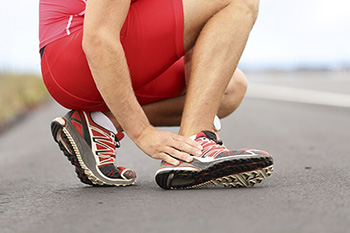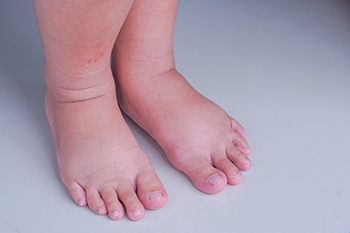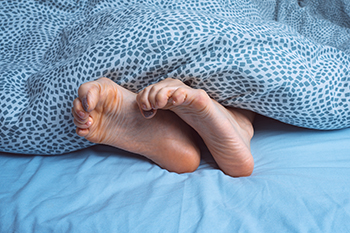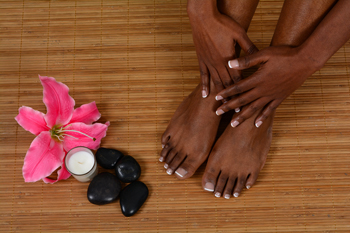

Obesity, a condition affecting millions globally, extends its impact beyond mere aesthetics, significantly influencing the health of the feet. The excess body weight borne by the feet places immense stress on the joints, tendons, and ligaments, potentially leading to a range of foot-related issues. One prevalent consequence is the development of flat feet or fallen arches, as the increased load alters the foot's biomechanics. Overpronation, where the foot rolls inward excessively, is also a common occurrence, contributing to conditions such as plantar fasciitis and Achilles tendonitis. The risk of stress fractures in the feet also rises due to the heightened strain on bones. Obesity may exacerbate existing conditions such as arthritis, causing increased pain and limited mobility. Additionally, the increased pressure on the plantar fat pad may lead to discomfort and pain in the heel and ball of the foot. Addressing obesity not only benefits overall health but also plays a pivotal role in mitigating the potential foot-related complications associated with carrying excess weight. If you are overweight and have foot pain, it is suggested that you consult a podiatrist who can monitor your foot health.
Obesity has become very problematic at this point in time and can have extremely negative effects on the feet. If you’re an obese individual and are concerned about your feet, contact Dr. Stephan J. LaPointe from Georgia Foot & Ankle Specialists . Our doctor can provide the care you need to keep you pain-free and on your feet.
Obesity and Your Feet
Since your feet are what support your entire weight when standing, any additional weight can result in pain and swelling. Being overweight is one of the main contributors to foot complications.
Problems & Complications
Extra Weight – Even putting on just a few extra pounds could create serious complications for your feet. As your weight increases, your balance and body will shift, creating new stresses on your feet. This uneven weight distribution can cause pain, even while doing the simplest tasks, such as walking.
Diabetes – People who are overweight are at serious risk of developing type-2 diabetes, which has a drastic impact on the health of your feet. As you get older, your diabetes might worsen, which could lead to loss of feeling in your feet, sores, and bruises. You could also become more prone to various infections.
Plantar fasciitis – Pressure and stress that is placed on muscles, joints, and tendons can trigger plantar fasciitis, which is an inflammation of tissue that forms along the bottom of the foot.
If you have any questions please feel free to contact our office located in Rome, GA . We offer the newest diagnostic and treatment technologies for all your foot and ankle needs.

Managing foot and ankle injuries in diabetic patients is complex. There is no one-size-fits-all approach for surgeries in these cases. Diabetic injuries can involve different types of bone breaks and dislocations, making treatment difficult. A major challenge is dealing with the limited soft tissue in the foot and ankle, which can easily become damaged. This is especially difficult in diabetic patients who might have other health issues like poor blood circulation or weak immune systems. Podiatrists treat surgeries in diabetic patients carefully to avoid harming the soft tissue and ensure proper healing. They often use special techniques, like minimal cuts or external supports, to repair the bones while protecting the skin and muscles. In severe cases, they may perform the surgery in stages. For diabetic patients, keeping bones stable and avoiding further injury is crucial, which sometimes involves additional support for nearby joints. If you are a diabetic patient and have sustained a foot or ankle injury, it is suggested that you make an appointment with a podiatrist immediately. This medical professional can make a proper diagnosis and evaluation, with a determination of whether surgery is right for you.
Foot and ankle trauma is common among athletes and the elderly. If you have concerns that you may have experienced trauma to the foot and ankle, consult with Dr. Stephan J. LaPointe from Georgia Foot & Ankle Specialists . Our doctor will assess your condition and provide you with quality foot and ankle treatment.
Foot and ankle trauma cover a range of injuries all over the foot; common injuries include:
Symptoms
Symptoms of foot and ankle injuries vary depending on the injury, but more common ones include:
Diagnosis
To properly diagnose the exact type of injury, podiatrists will conduct a number of different tests. Some of these include sensation and visual tests, X-rays, and MRIs. Medical and family histories will also be taken into account.
Treatment
Once the injury has been diagnosed, the podiatrist can than offer the best treatment options for you. In less severe cases, rest and keeping pressure off the foot may be all that’s necessary. Orthotics, such as a specially made shoes, or immobilization devices, like splints or casts, may be deemed necessary. Finally, if the injury is severe enough, surgery may be necessary.
If you have any questions, please feel free to contact our office located in Rome, GA . We offer the newest diagnostic and treatment technologies for all your foot care needs.

The journey of pregnancy, though miraculous, often brings with it the discomfort of swollen feet and ankles. This common ailment, known as edema, results from increased pressure on blood vessels and the growing uterus, leading to fluid retention. To mitigate this discomfort, expectant mothers can embrace simple yet effective strategies. Elevating the legs when possible aids in fluid circulation, reducing the severity of swelling. Wearing comfortable, supportive shoes and avoiding prolonged periods of standing or sitting can also contribute to relief. Staying well-hydrated supports the body in maintaining a healthy fluid balance. Incorporating gentle exercises, such as walking or prenatal yoga, promotes circulation and minimizes swelling. Additionally, mindful salt intake can prevent excessive fluid retention. By incorporating these nurturing practices into their daily routines, pregnant women can enhance their well-being and navigate the pregnancy with greater comfort and ease. If you suffer from swollen feet and ankles during your pregnancy or have foot pain for any reason, it is suggested that you speak with a podiatrist who can guide you toward additional relief strategies.
Pregnant women with swollen feet can be treated with a variety of different methods that are readily available. For more information about other cures for swollen feet during pregnancy, consult with Dr. Stephan J. LaPointe from Georgia Foot & Ankle Specialists . Our doctor will attend to all of your foot and ankle needs.
What Foot Problems Can Arise During Pregnancy?
One problem that can occur is overpronation, which occurs when the arch of the foot flattens and tends to roll inward. This can cause pain and discomfort in your heels while you’re walking or even just standing up, trying to support your baby.
Another problem is edema, or swelling in the extremities. This often affects the feet during pregnancy but tends to occur in the later stages.
How Can I Keep My Feet Healthy During Pregnancy?
If you have any questions please feel free to contact our office located in Rome, GA . We offer the newest diagnostic and treatment technologies for all your foot and ankle needs.

An Achilles tendon rupture often presents suddenly, typically accompanied by a sharp pain in the back of the leg and sometimes an audible snapping sound. Many people with this injury mistakenly believe they have been hit in the calf. When examining for an Achilles rupture, the presence of swelling and bruising varies and is not entirely reliable. The gap in the tendon that indicates a rupture is often not easily palpable due to local swelling. In terms of mobility, patients can usually still perform some active movement in the ankle because other tendons also connect the calf to the foot. Pain affects passive movement but does not always limit it. Despite a ruptured Achilles, those affected can often still walk and may even be able to stand on tiptoes when using both feet, though not on the injured limb alone. The Simmonds' calf squeeze test is a reliable way for podiatrists to check for an Achilles tendon rupture. The test is done by having the patient kneel or lie prone with dangling feet. The healthy calf is used to see the foot flex, while no movement on the injured side indicates a ruptured Achilles tendon. If you believe you may have injured your Achilles tendon, it is strongly suggested that you make an appointment with a podiatrist for a thorough evaluation, diagnosis, and appropriate treatment.
Achilles tendon injuries need immediate attention to avoid future complications. If you have any concerns, contact Dr. Stephan J. LaPointe of Georgia Foot & Ankle Specialists . Our doctor can provide the care you need to keep you pain-free and on your feet.
What Is the Achilles Tendon?
The Achilles tendon is a tendon that connects the lower leg muscles and calf to the heel of the foot. It is the strongest tendon in the human body and is essential for making movement possible. Because this tendon is such an integral part of the body, any injuries to it can create immense difficulties and should immediately be presented to a doctor.
What Are the Symptoms of an Achilles Tendon Injury?
There are various types of injuries that can affect the Achilles tendon. The two most common injuries are Achilles tendinitis and ruptures of the tendon.
Achilles Tendinitis Symptoms
Rupture Symptoms
Treatment and Prevention
Achilles tendon injuries are diagnosed by a thorough physical evaluation, which can include an MRI. Treatment involves rest, physical therapy, and in some cases, surgery. However, various preventative measures can be taken to avoid these injuries, such as:
If you have any questions please feel free to contact our office located in Rome, GA . We offer the newest diagnostic tools and technology to treat your foot and ankle needs.

The ankle is a complex joint consisting of the subtalar joint, tibiotalar joint, and distal tibiofibular joint. It relies on ligaments to prevent excessive movement and ensure stability. When these ligaments become compromised, ankle surgery may be an option. In such cases, anatomical reconstruction is the preferred approach for repairing damaged ankle ligaments. This procedure aims to restore torn or stretched ligaments and can use either the patient's own tissue or a cadaver tendon, depending on the ligament's condition. During anatomical reconstruction, an ankle surgeon may also tighten the fibrous tissue band to improve ankle alignment and prevent future injuries. In contrast, peroneal substitution ligament reconstruction involves replacing the damaged ligament with another tendon harvested from the patient's ankle. While a viable option, it is generally considered less effective than anatomical reconstruction. Recovery times for both procedures are roughly six weeks, but it may be much longer before you can safely resume sports activities. The choice of surgery should be made in consultation with a podiatrist who is a qualified foot and ankle surgeon. This foot doctor will tailor the surgery to your specific needs and follow with thorough post-operative care and rehabilitation. If you have severely injured your ankle, it is suggested that you make an appointment with a podiatrist as quickly as possible.
Foot surgery is sometimes necessary to treat a foot ailment. To learn more, contact Dr. Stephan J. LaPointe of Georgia Foot & Ankle Specialists . Our doctor will assist you with all of your foot and ankle needs.
When Is Surgery Necessary?
Foot and ankle surgery is generally reserved for cases in which less invasive, conservative procedures have failed to alleviate the problem. Some of the cases in which surgery may be necessary include:
What Types of Surgery Are There?
The type of surgery you receive will depend on the nature of the problem you have. Some of the possible surgeries include:
Benefits of Surgery
Although surgery is usually a last resort, it can provide more complete pain relief compared to non-surgical methods and may allow you to finally resume full activity.
Surgical techniques have also become increasingly sophisticated. Techniques like endoscopic surgery allow for smaller incisions and faster recovery times.
If you have any questions please feel free to contact our office located in Rome, GA . We offer the newest diagnostic and treatment technologies for all your foot and ankle needs.

Nighttime foot cramps are a common and disruptive issue, affecting up to 60 percent of adults. They can be caused by inactivity, poor posture, and sleeping positions that restrict blood flow and compress nerves. Overexerting foot muscles through excessive activity or fatigue can lead to muscle cramping, as can wearing improper footwear or working on hard surfaces. Dehydration, often from inadequate water intake or illness, can result in foot muscle cramps due to electrolyte imbalances. Nutrient deficiencies, particularly in vitamins B-12, thiamin, folate, magnesium, and potassium, can lead to nerve damage and cause cramps. Excessive alcohol use may cause nerve damage and alcoholic neuropathy that may contribute to foot cramps. Pregnancy, especially in the later stages, can bring on leg and foot cramps, possibly due to increased weight and nutritional deficiencies. Certain health conditions like peripheral arterial disease, kidney disease, anemia, and diabetes can also be associated with nighttime foot cramps. If your foot cramps occur frequently and do not improve even after making adjustments to your routine, it is suggested that you make an appointment with a podiatrist. This specialist in foot and ankle care can perform a thorough evaluation, provide you with a proper diagnosis, and recommend treatment options to alleviate your discomfort.
Foot Pain
Foot pain can be extremely painful and debilitating. If you have a foot pain, consult with Dr. Stephan J. LaPointe from Georgia Foot & Ankle Specialists . Our doctor will assess your condition and provide you with quality foot and ankle treatment.
Causes
Foot pain is a very broad condition that could be caused by one or more ailments. The most common include:
Diagnosis
To figure out the cause of foot pain, podiatrists utilize several different methods. This can range from simple visual inspections and sensation tests to X-rays and MRI scans. Prior medical history, family medical history, and any recent physical traumatic events will all be taken into consideration for a proper diagnosis.
Treatment
Treatment depends upon the cause of the foot pain. Whether it is resting, staying off the foot, or having surgery; podiatrists have a number of treatment options available for foot pain.
If you have any questions, please feel free to contact our office located in Rome, GA . We offer the newest diagnostic and treatment technologies for all your foot care needs.

Our feet bear the brunt of our daily activities, making everyday foot care an essential part of maintaining overall well-being. There are several practical tips to ensure your feet stay healthy and pain-free. These can begin with washing your feet daily, ensuring to dry thoroughly, especially between the toes. Keeping your toenails trimmed straight across and not too short may help to prevent ingrown toenails. Choose comfortable, well-fitting shoes that provide proper arch support and cushioning. Additionally, it is beneficial to alternate your shoes to give them time to air out, reducing the risk of foot odor and fungal infections. Regularly moisturize your feet to prevent dry, cracked skin. Performing regular foot stretches and massages can help improve circulation and relieve tension. Be mindful of foot pain or discomfort, as early intervention can prevent more significant issues. Lastly, maintaining a healthy weight and staying active can reduce the strain on your feet. If you would like to have more information about everyday foot care tips, it is suggested that you confer with a podiatrist.
Everyday foot care is very important to prevent infection and other foot ailments. If you need your feet checked, contact Dr. Stephan J. LaPointe from Georgia Foot & Ankle Specialists . Our doctor can provide the care you need to keep you pain-free and on your feet.
Everyday Foot Care
Often, people take care of their bodies, face and hair more so than they do for their feet. But the feet are a very important aspect of our bodies, and one that we should pay more attention to. Without our feet, we would not be able to perform most daily tasks.
It is best to check your feet regularly to make sure there are no new bruises or cuts that you may not have noticed before. For dry feet, moisturizer can easily be a remedy and can be applied as often as necessary to the affected areas. Wearing shoes that fit well can also help you maintain good foot health, as well as making it easier to walk and do daily activities without the stress or pain of ill-fitting shoes, high heels, or even flip flops. Wearing clean socks with closed shoes is important to ensure that sweat and bacteria do not accumulate within the shoe. Clean socks help to prevent Athlete’s foot, fungi problems, bad odors, and can absorb sweat.
If you have any questions please feel free to contact our office located in Rome, GA . We offer the newest diagnostic and treatment technologies for all your foot and ankle needs.

High heels are a popular fashion choice, often adding a stylish touch to special occasions. However, one should be aware of the potential negative effects on foot health when worn regularly. High heels can lead to various foot problems, including bunions, blisters, corns, and calluses. One common side effect is lower back pain, as these shoes lack adequate foot support, causing an uneven weight distribution. Foot pain is prevalent due to circulation problems and metatarsalgia. Ankle sprains, broken ankles, and awkward spinal curvature may result from wearing high heels, especially on uneven surfaces. Furthermore, high heels can constrict blood vessels and hinder natural blood flow, potentially leading to varicose veins and deformities such as hammertoe. They can also weaken ligaments and increase pressure on the knee joint, possibly causing osteoarthritis. If you enjoy wearing high heels, it is suggested that you make an appointment with a podiatrist to discuss the frequency of wear and consider alternative footwear choices that may help prevent potential health issues.
High heels have a history of causing foot and ankle problems. If you have any concerns about your feet or ankles, contact Dr. Stephan J. LaPointe from Georgia Foot & Ankle Specialists . Our doctor can provide the care you need to keep you pain-free and on your feet.
Effects of High Heels on the Feet
High heels are popular shoes among women because of their many styles and societal appeal. Despite this, high heels can still cause many health problems if worn too frequently.
Which Parts of My Body Will Be Affected by High Heels?
What Kinds of Foot Problems Can Develop from Wearing High Heels?
How Can I Still Wear High Heels and Maintain Foot Health?
If you want to wear high heeled shoes, make sure that you are not wearing them every day, as this will help prevent long term physical problems. Try wearing thicker heels as opposed to stilettos to distribute weight more evenly across the feet. Always make sure you are wearing the proper shoes for the right occasion, such as sneakers for exercising. If you walk to work, try carrying your heels with you and changing into them once you arrive at work. Adding inserts to your heels can help cushion your feet and absorb shock. Full foot inserts or metatarsal pads are available.
If you have any questions please feel free to contact our office located in Rome, GA . We offer the newest diagnostic and treatment technologies for all your foot and ankle needs.